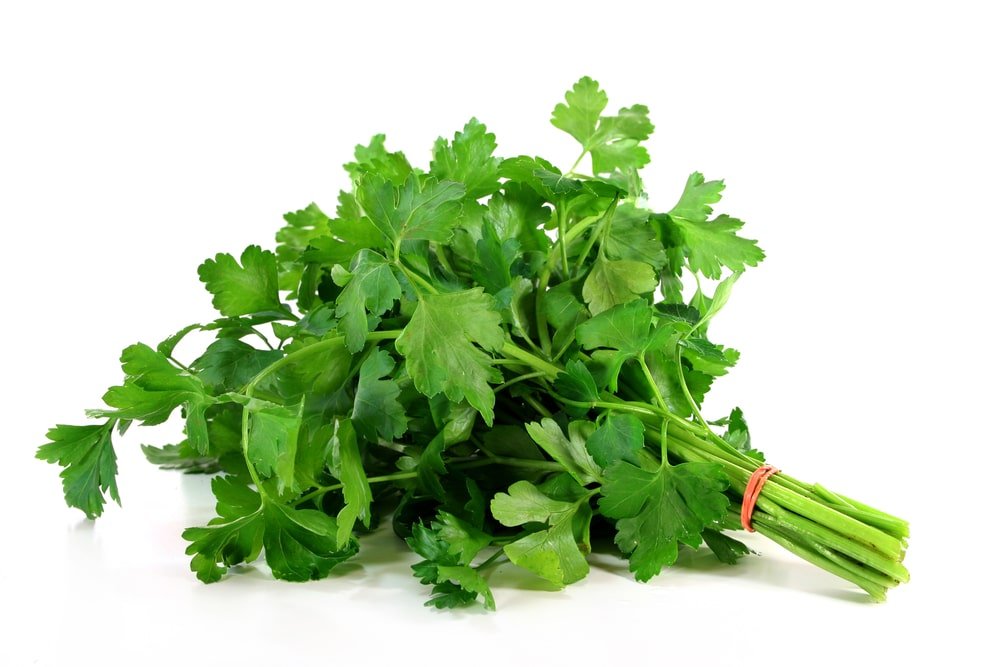Parsley health benefits includes preventing halitosis, fighting skin cancer, fighting diabetes, promoting bone health, boosting immune system, serving as a natural antibiotic, keeping the heart healthy and detoxifying the body. Other benefits includes fighting arthritis, whitening skin and giving clearer complexion and promoting healthy hair.
When we think of parsley, we think of green sprinkles on top of our steaks, our stews, and our rice dishes. Parsley or Petroselinum crispum, its scientific name, is a type of flowering plant in the genus Apiaceae. This plant is cultivated as an herb, a spice, and a vegetable. The Mediterranean region is believed to be the home of the garden parsley.
What is Parsley?
Parsley is widely used as a garnish or topping in various European, American, and Middle Eastern cuisines. It is also used as the main ingredient of a salad such as Lebanon’s Tabbouteh and condiments such as Italy’s salsa verde. But what does a parsley have that made it so special to health conscious citizens, nutritionists, and healthcare professionals alike?

11 Amazing Health Benefits of Parsley

1. Prevents Halitosis
Nobody likes to have a conversation with a person who has bad breath. Make it a habit to integrate parsley into your meal. It has antibacterial properties that inhibits the development of bacteria that promote bad breath in your mouth. You can munch on a parsley sprig after every meal to freshen your breath. Eating parsley can help eliminate body odor and treat excessive flatulence as well.
2. Serves as an Anticancer Powerhouse
It contains a flavonoid called myricetin. Myricetin is also found in cranberries, blackcurrants, and sweet potatoes. The higher the myricetin a plant contains, the more aggressive it becomes in fighting skin cancer.
The bright green color of the garden parsley shows that it is completely chock-full of chlorophyll. Chlorophyll is proven effective at creating a line of defense against carcinogenic agents of heterocyclic amines that are generated when grilling meat at high temperatures. Charred meat have been linked to various types of cancers. If you like barbecue, pair it with green vegetables to reduce the effects.
Apigenin is also found in parsley. Researchers from the University of Missouri conducted a successful study where they used the natural chemical to decrease the size of tumors caused by breast cancer.
3. Fights Diabetes
Myricetin is also efficient in the prevention and natural treatment of diabetes. The said flavonoid has been evaluated for its efficacy in lowering blood sugar while decreasing insulin resistance in the body. It also provides anti-inflammatory effects and helps reduce fat from the blood.
4. Promotes Bone Health
Vitamin K deficiency can lead to bone fractures. This vitamin has the ability to alter your bone matrix. Vitamin K also plays a crucial role in calcium absorption and managing urinary excretion of calcium in the body. With just 10 sprigs, parsley can provide you an adequate amount of vitamin K that your body needs.
It has the array of vitamins and minerals that help your body develop strong bones. Vitamin C also helps in this area since collagen needs vitamin C to be synthesized. You need collagen to build the support around your bones; otherwise, your bones will become fragile and vulnerable to fractures.
5. Boosts Immune System
While vitamin K promotes bone health, the wealth of vitamin C found in it serves as an excellent immune system booster. It is already general knowledge that vitamin C plays a vital role in preventing common diseases such as colds and influenza. Parsley is also a good source of beta carotene. Beta carotene is an antioxidant that help protect the body from free-radicals that hasten the effects of aging.
6. Serves as a Natural Antibiotic
Despite popular belief that it is unsuitable for individuals with kidney problems, Bastrop University has recommended parsley among the few herbs that can replace antibiotics in remedying urinary tract infections. According to The Urology Journal, parsley assists in maintaining a healthy urinary tract when the leaves or roots are consumed.
7. Keeps the Heart Healthy
It contains a substantial amount of folate, which is involved in normal cells replication. It is a B vitamin with various functions, but above all, its most important function is fighting cardiovascular diseases. Folic acid reduces homocysteine, a naturally occurring amino acid in the human body. Homocysteine damages blood vessels once it reaches high concentrations. High concentrations of homocysteine can result in negative repercussion on your heart health. Damaged blood vessels increase the risks of stroke. Folate reduces homocysteine to harmless methionine.
8. Detoxifies the Body
The Flavonoids apigenin and myristicin that are abundant in parsley can boost the productivity of liver enzymes responsible for detoxifying your body.
It is also a diuretic. Drink tea infused with parsley. This is a great way to detoxify your body and relieve yourself from water retention and bloating. This tiny herb helps to flush your urinary system and help ease the strain of your kidneys.
9. Fights Arthritis
The tiny plant has been evaluated for its ability to fight arthritis. In fact, a study was published in the Annals of the Rheumatic Diseases that included 20, 000 subjects. Those who had higher intake of vitamin C were less likely to be afflicted by arthritis. Parsley is abundant in vitamin C, reducing inflammation and oxidation damage to joints.
10. Whitens Skin and Gives Clearer Complexion
Glutathione is among the most important antioxidants. Booking weekly sessions of glutathione IV drip or glutathione push treatments are very popular in Asia. Men and women undergo these type of treatments to achieve a “whiter” and clearer complexion. If you are young and you care about your appearance, you can whiten your skin by simply integrating parsley into your meals. Myristicin in parsley activates the production of glutathione.
Parsley can also help reduce acne. Vitamin C inhibits inflammation while vitamin K speeds up skin healing and lessens redness. It may also help diminish acne blemishes over time.
11. Promotes Healthy Hair
Before cosmetic manufacturers created shampoos and conditioners, parsley was used as a hair tonic to disinfect scalp, stimulate hair growth and add shine. Parsley contains an antioxidant flavonoid called apigenin. Apigenin controls hair loss according to recent studies. Parsley also contain a high amount of copper which helps retain your hair color.
Conclusion
It is a rich source of flavonoids, folic acid, vitamins A, C, and K. A tablespoon of dried parsley has about 12 μg of lycopene, 21.4 μg of alpha carotene, and 161.4 μg of beta carotene. Adding herbs and spices like parsley in your meal is a great way to enhance the presentation of your dish, boost its aroma, and add more flavor without the unnecessary sodium. Most of all it is a great way to add essential nutrients and make most of the big health benefits that the tiny herb can offer.
In the end, normal consumption of parsley, or any food in general, must be observed. Excessive consumption of parsley may cause uterotonic effects on pregnant women. It is the overall diet and lifestyle that is important in achieving good health.



